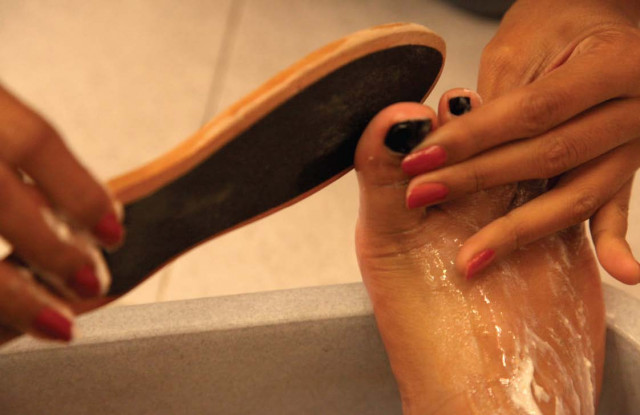That pedicure may not look drop dead gorgeous if it kills you
Beauty parlour owners react to study that shows 300 salons do not sanitise equipment.

Sehar has been a regular client of a salon for the last 10 years. Even though she says she finds the place very clean, she takes her own manicure and pedicure kit each time and disinfects it later at home.
She has good reason to do so. A recent study conducted for the Health Foundation explored measures taken by around 250 beauty parlours — big and small — in Defence Housing Authority, Gulshan-e-Iqbal, Nazimabad, Shah Faisal Town, Malir, Korangi and Landhi. Researchers found that the greatest risk of cuts and snips takes place during pedicures and manicures. These cuts expose clients to a greater hepatitis risk, more so with contaminated tools and equipment.
“There were no proper techniques and procedures for disinfecting the dirty tools and equipment used for clients,” said one of the researchers. “Some of them would just wash them with water and get ready to use them on the next person.”
In Pakistan people are just waking up to these risks in public health. The issue of nail salon sanitation became national news in the US when the “American Idol” judge Paula Abdul had her thumbnail removed in 2004 after contracting an infection she said she got from a manicure.
Here the message has a long way to go but as a start, two weeks ago, at the Dow University of Health Sciences, Sindh Health Secretary Syed Hashim Raza Zaidi said that more than 300 beauticians in Karachi and Hyderabad would be vaccinated for hepatitis B and C as one in every 10 women who visits salons is infected by hepatitis according to the study. The Health Foundation has urged beauticians to get registered. According to an expert quoted in 2006 in The New York Times, customers can potentially pick up athlete’s foot, warts or yeast infections, or even, possibly, HIV, hepatitis C, or staph infections if salons do not disinfect equipment properly.
For their part, doctors advise that equipment should be properly washed before soaking them in a water solution with one-tenth of bleach for 30 minutes. This will completely disinfect them. Simply using disinfectants, such as a household brand of anti-septics, is not enough.
“There is a difference between cleaning and sterilising. We wash our plates every day but we don’t sterilise them,” says gastroenterologist Dr Saad Khalid Niaz “Sharp objects, especially if there is blood on them, need to be sterilised.”
Most salons do sterilise, but each have their own methods and some may not be as effective. “Some salons use sterilising machines, others use a liquid antiseptic. A few prefer topical solutions (chlorhexidine gluconate) while others boil the tools as a way of disinfecting them,” she explained.
During the wedding season, smaller parlours give up to 10 manicures and 10 pedicures every day while the average rises to 15 in bigger salons.
Most of the salons in the study lacked awareness with most owners were not terribly interested in the sanitary aspect of the business, the study stated. However, the president of the Pakistan Hairdressers and Beauticians Association (Phaba), Ruhana Iqbal, opposed this.
Barbers as opposed to salons need to be aggressively targeted, she said. “Sure, there is a risk of cuts during manicures and pedicures but it is barbers who use razors more frequently,” she argued. Admitting that it was difficult to keep track of sanitary practices at small parlours, she says the 500 members of Phaba are now using disposable papers for waxing instead of cloth strips that are washed and reused.
Meanwhile, Angie Marshall, the CEO of Angie’s Salon, said dental clinics, small maternity homes and barbers, especially those operating from makeshift camps, pose a much higher risk of spreading infectious diseases.
Dr Niaz has the same opinion. “Certainly smaller maternity homes and dental clinics pose a serious threat. But there are simple precautions that can be taken to avoid possible transmission,” he told The Express Tribune.
On a personal note, Niaz says that people in the country do not seem to value their health. “The message of simply not reusing needles and blades and properly disinfecting reusable tools doesn’t seem to be getting through to the common person,” he said in a frustrated tone.
Marshall felt that due diligence lies with clients as well. “They need to be more aware of risks and not compromise their health and safety. For a few hundred rupees, they visit cheaper salons risking the contraction of infections.”
Published in The Express Tribune, April 13th, 2011.



















COMMENTS
Comments are moderated and generally will be posted if they are on-topic and not abusive.
For more information, please see our Comments FAQ